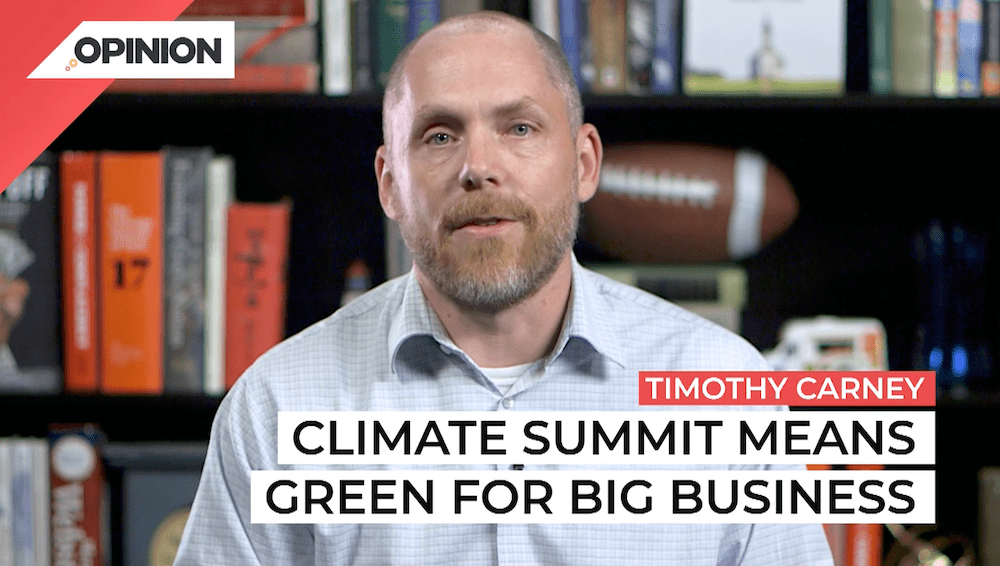
Commentary
-
Our commentary partners will help you reach your own conclusions on complex topics.
What does the color green mean to you?
In very green Scotland, governments from all over the world are meeting for their periodic climate summit.
There will be plenty of talk of green energy, green finance, green building—and all of it will mean green for big, politically connected companies in Europe and the U.S.
The United Nations is hosting a climate meeting in Glasgow starting on October 31. It’s called “COP-26,” as it’s the 26th annual “Conference of the Parties” to the UN’s climate-change framework.
The countries are trying to implement the Paris Accords, which were agreements among nations to reduce emissions and otherwise fight climate change and its effects.
One topic that will get extra attention this year is what’s called “Climate Finance.” In short, it’s rich countries paying poorer countries to deal with emissions or climate change.
There’s some sense here. Green energy, such as solar and wind energy, is more expensive and less reliable than fossil-fuel energy such as natural gas and coal.
The U.S., Canada, Australia, and much of Western Europe got rich in part by using these God-given resources to get cheap and reliable energy that allows industries and communities to flourish.
Now that poor countries are starting to rise out of poverty and develop a middle class and more industries, are the rich countries really going to bar them from using the same affordable energy and instead force luxury green energy on them?
Or will rich countries simply let poor countries do what they want?
In that case, the climate fight would be a story of coal-fired plants moving from Michigan and Bavaria to Mongolia and Botswana. This will hardly reduce pollution or greenhouse gas emissions.
So a deal was cut: Wealthy countries would pay the poor countries to go green.
The wealthy countries last decade pledged to give a hundred billion dollars a year in “climate finance” to fund poor countries’ climate mitigation and adaptation.
Rich countries didn’t quite meet their hundred-billion goal in 2020, but they did pump more than 80 billion into “climate finance” in poor countries.
We can expect in Glasgow, governments to agree to increase that hundred-billion-a-year goal.
These payments function in part as bribes, to get the poor countries—many of whom face far more pressing issues—enthusiastically on board with the rich countries’ whole climate fight.
But the billions and billions in global “climate finance” ought to be seen mostly as payoffs to politically connected companies in rich countries.
Here’s what “climate finance” means in practice: The government of, say, Germany, send money to a foreign government on the condition that foreign country hires a German company to install wind farms or solar panels. Or rich governments subsidize poor countries’ purchase of electric cars.
The Big Banks get in on this, too. Often “climate finance” means a rich government guarantees a loan made by a Big Bank to a poor country buying something like energy-efficient building materials. For the Big Banks, this is free money — if the poor country can’t pay back the loan, the rich country’s taxpayers foot the bill.
It’s the same as the United States’ domestic climate-change efforts.
Look at Joe Biden’s proposals: massive subsidies for rich people to buy electric cars — this is effectively transferring tax dollars to Tesla.
Biden’s main new climate proposal is a $150 billion dollar boondoggle called the Clean Electricity Performance Program, which mostly amounts to paying utilities for increasing their investment in wind and solar — which in turn is another subsidy from U.S. taxpayers to the companies that build and install wind and solar.
Often, when you follow the money, you realize how these environmentalist programs don’t actually help the planet that much.
For instance, rules forcing American automakers to make their cars lighter weight, resulted in them replacing steel with aluminum.
Guess who loved this proposal: Alcoa, the world’s largest aluminum company.
So when you see billions pledged in global climate finance, or an expensive Biden green energy plan, remember that Green is the color of money.
-
How Biden’s tax on Chinese metal harms Americans
President Joe Biden announced plans to triple tariffs on Chinese steel and aluminum to protect American jobs from “unfair” competition. The White House said China is hurting the U.S. economy by selling steel at very low prices. Watch the video above as Straight Arrow News contributor Timothy Carney argues that while Biden’s new tariffs might…
-
Democrats use climate change issues to help sell liberal agenda
According to a January survey, only 12% of Republicans say dealing with climate change should be a top priority for the president and Congress, ranking the issue last among the 20 included in the survey. By contrast, 59% of Democrats say climate change should be a top priority for the president and Congress. While Democrats may…
-
HHS Secretary Becerra’s crusade against Catholicism
When President Joe Biden took office, he nominated Xavier Becerra, a former California congressman and attorney general, to run the U.S. Department of Health and Human Services (HHS). As California’s attorney general, Becerra was at the forefront of legal efforts on health care. In his current position as HHS secretary, Becerra is a strong proponent…
-
Universities must blame themselves for protest hypocrisy
U.S. college protests over the Israel-Hamas war have divided college campuses, often pitting university officials and executives against their own students and faculty. And yet, as Straight Arrow News contributor Timothy Carney points out, many of today’s university officials are actually the anti-Vietnam War protesters of a previous era’s student protest movement. Today, those same…
-
Subsidizing demand won’t fix real problems
The Biden administration recently announced an initiative to cap child care copay expenses for approximately 100,000 low-income working families in the United States. Instead of paying set fees, those families will pay 7% of whatever their total income is as a copay for the government-subsidized daycare program. The program also hopes to fully cover all…
Latest Opinions
-
 U.S. Department of Defense
U.S. Department of Defense
Congress still trying to figure out how to reduce wasteful military spending
-
 DVIDS
DVIDS
US Navy, Air Force making waves with new weapons at RIMPAC
-
 Getty Images
Getty Images
Israeli PM Netanyahu meets with Trump at Mar-a-Lago
-
 Getty Images
Getty Images
Growing US nuclear power resurgence reaches the nation’s heartland
-
 Getty Images
Getty Images
Beer from the sun, other solar thermal projects get government funding
Popular Opinions
-
In addition to the facts, we believe it’s vital to hear perspectives from all sides of the political spectrum.


